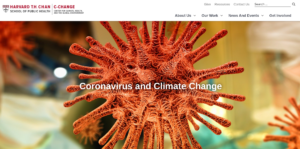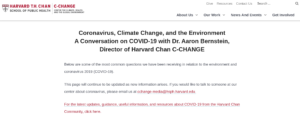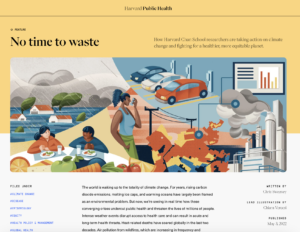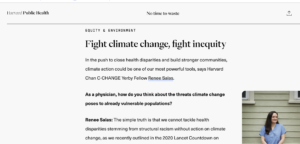Note: Harvard School of Public Health tied to China: “The Harvard Chan School became the first foreign school of public health to work with the Chinese government and Chinese schools of public health…Harvard faculty guided and assisted China in establishing the field of health policy and management…”
https://www.hsph.harvard.edu/c-change/subtopics/coronavirus-and-climate-change/
Dr. Aaron Bernstein, Director of Harvard Chan C-CHANGE
Does climate change affect the transmission of coronavirus?
Dr. Aaron Bernstein:

We don’t have direct evidence that climate change is influencing the spread of COVID-19, but we do know that climate change alters how we relate to other species on Earth and that matters to our health and our risk for infections.
As the planet heats up, animals big and small, on land and in the sea, are headed to the poles to get out of the heat. That means animals are coming into contact with other animals they normally wouldn’t, and that creates an opportunity for pathogens to get into new hosts.
Many of the root causes of climate change also increase the risk of pandemics. Deforestation, which occurs mostly for agricultural purposes, is the largest cause of habitat loss worldwide. Loss of habitat forces animals to migrate and potentially contact other animals or people and share germs. Large livestock farms can also serve as a source for spillover of infections from animals to people. Less demand for animal meat and more sustainable animal husbandry could decrease emerging infectious disease risk and lower greenhouse gas emissions.
We have many reasons to take climate action to improve our health and reducing risks for infectious disease emergence is one of them.
…
How likely are we to see infectious disease spread as a result of climate change?
Climate change has already made conditions more favorable to the spread of some infectious diseases, including Lyme disease, waterborne diseases such as Vibrio parahaemolyticus which causes vomiting and diarrhea, and mosquito-borne diseases such as malaria and dengue fever. Future risks are not easy to foretell, but climate change hits hard on several fronts that matter to when and where pathogens appear, including temperature and rainfall patterns. To help limit the risk of infectious diseases, we should do all we can to vastly reduce greenhouse gas emissions and limit global warming to 1.5 degrees.
…
We also need to take climate action to prevent the next pandemic. For example, preventing deforestation—a root cause of climate change—can help stem biodiversity loss as well as slow animal migrations that can increase risk of infectious disease spread. The recent Ebola epidemic in West Africa probably occurred in part because bats, which carried the disease, had been forced to move into new habitats because the forests they used to live in had been cut down to grow palm oil trees.
Rethinking our agricultural practices, including those that rely on raising tens of millions of animals in close quarters, can prevent transmissions between animals and spillover into human populations.
Reducing air pollution caused by burning fossil fuels like coal, oil and natural gas also helps keep our lungs healthy, which can protect us from respiratory infections like coronavirus.
To combat climate change, we need to drastically decrease greenhouse gas emissions. Generating electricity from low-carbon energy sources like wind and solar decreases harmful air pollutants such as nitrogen oxides, sulfur dioxide, and carbon dioxide that lead to more heart attacks and stroke as well as obesity, diabetes, and premature deaths that put further strains on our health care systems.
Preparation for pandemics is also about keeping people healthy at baseline. If we have a population in the U.S. where a third of our population are obese, and 5-10% of people have diabetes, we’re going to be immensely more vulnerable. And if you look at why people in the U.S. are not healthy at baseline, it has to do with our diets, pollution, and climate change. We have an opportunity here to recognize that prevention is by far the best approach to protecting health.
When COVID-19 eases, and we are ready to restart our economy, we can make our workforce healthier and more climate-resilient through scaling-up our investments in low-carbon technologies.
…
Why is it so important for health officials to talk about climate change now?
Having taken care of children and families who are deeply concerned about how they can protect their children from this disease, I can tell you that we need to wash our hands and we need to socially distance. But if we really care about preventing this kind of problem in the future, we need to think hard about climate change and the biodiversity crisis. I was actually in a room with a child and a family when I first thought that this is exactly the time that we need to think more about the broader issues that we face. We simply cannot afford to deal with a crisis like this pandemic on top of another climate-related crisis—like a hurricane, tornado, wildfire, or heatwave—when we absolutely know how to implement climate solutions, and can put them into action right now. Doing so will make us healthier today and protect our future.
Climate change and global health policy are largely treated as separate issues by the public and media. Do we need to adjust our thinking?
Yes. The separation of health and environmental policy is a dangerous delusion. Our health entirely depends on the climate and the other organisms we share the planet with. We need to bring these communities together. Some progress has been made in addressing the risk of pathogen spillover from animals into people. But largely we still view the environment, and life on earth, as separate. We can and must do better if we want to prevent the next infectious pandemic. That means we must combat climate change and do far more to safeguard the diversity of life on earth, which is being lost at a rate not seen since the dinosaurs—and more than half of life on earth—went extinct 65 million years ago.
…
At Harvard Chan C-CHANGE, our research shows that the actions we need to combat climate change are the same actions we need to make people healthier right now, especially for diseases causing huge burdens on our health like obesity, heart disease, and cancer. We need to do much more to talk about the “burden of disease” that’s preventable, and the things we can do now to prevent it.
#
Covid won’t be contained until we raise the minimum wage to $15/hour https://t.co/Waig4TbJqS
— Tom Elliott (@tomselliott) December 25, 2020
#






